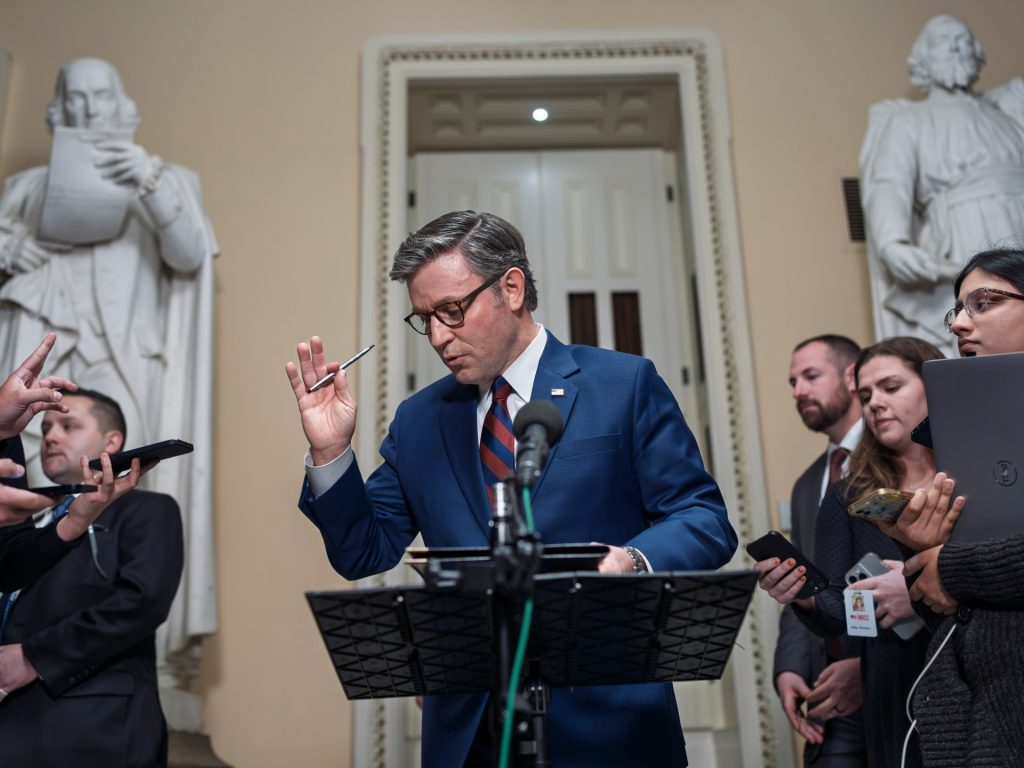United States President-elect Donald Trump has approved the continuation of Mike Johnson’s leadership in the House of Representatives, in an apparent effort to limit Republican dissension in the new year.
In a post on his online platform Truth Social on Monday, Trump called on his Make America Great Again (MAGA) base to rally support for Johnson, who currently serves as speaker of the House.
“Speaker Mike Johnson is a good, hardworking and religious man. He will do the right thing and we will continue to WIN. Mike has my full and total approval. MAGA!!!” Trump wrote.
But the road ahead for Johnson is likely to be difficult. On January 3, a new Congress convenes, following November’s general election. And Republicans are bracing for a tense showdown over who will be voted the next speaker, the top official in the House of Representatives.
Johnson is the most likely candidate, as acting chairman. But his role in passing a last-minute budget bill earlier this month revealed fractures in the Republican caucus — and a possible backlash against his leadership.
A representative from Louisiana known for socially conservative policies, Johnson will need every Republican vote he can muster to retain the speakership.
When the 119th Congress convenes, Republicans will claim one of the smallest House majorities in modern history. They will have 219 seats in the House of Representatives out of a total of 435, giving them barely more than 50 percent of the chamber’s votes.
Democrats traditionally cast their votes for a House leader from their own party. As a result, even a handful of Republicans may award Johnson the speakership.
Already, some Republican members of the House have come out against Johnson’s leadership. Thomas Massie of Kentucky, for example, has been vocal that he will not vote for Louisiana’s representative.
“I’m going to vote for someone other than Mike Johnson,” Massie wrote on social media on Dec. 27. “A weak, swamp-bound legislative branch will be unable to deliver on the mandate voters gave Trump and Congress in November.”
Part of the reason for the disagreement lies in Johnson’s support for the bipartisan budget bill that was finally signed into law on Dec. 21, avoiding a government shutdown during the holiday season.
Some Republicans opposed the measure for failing to rein in spending. Others, including Massie, expressed concern that an early version of the bill contained provisions that went beyond the budget. They called for a “clean” budget bill.
And then there was the omission of a key priority that Trump himself had advanced. Trump had called for the budget bill to contain language that extends or removes the debt ceiling, which limits how much the federal government can borrow.
Traditionally, the federal budget is negotiated separately from the debt ceiling. But on social media, Trump called for debt ceiling negotiations to take place under outgoing President Joe Biden, a Democrat, rather than during his next administration.
Under the Fiscal Responsibility Act of 2023, the debt ceiling is suspended until January 1, 2025.
But Treasury Secretary Janet Yellen has already warned that the federal government could hit its borrowing limit by the middle of that month, limiting its ability to pay its bills and potentially damaging the nation’s credit score.
Trump himself is scheduled to take office for a second term on January 20. He has called the debt ceiling a “guillotine” hanging over his administration.
Ultimately, the Johnson-led budget bill passed without the debt ceiling legislation that Trump had sought.
Such disputes have cost at least one past speaker. Johnson’s predecessor, former Republican House Speaker Kevin McCarthy, also oversaw passage of a bipartisan budget bill that was controversial on the right wing of his party.
This sparked a vendetta against McCarthy’s leadership in October 2023. Members of the Freedom Caucus, a coalition of hardline conservatives, came together to oust McCarthy from the presidency in a historic vote—marking the first time a speaker had been removed from a motion to vacate his seat.
But the decision plunged the House Republican caucus into weeks of chaos as party members scrambled to find a new leader. Johnson was not the first choice: He was the fourth candidate to be nominated for the position.
Since then, Johnson has faced a similar attempt to oust him from the presidency.
On Monday, however, Trump sought to distance the Republican Party from that past turmoil. In his social media post, he tried instead to cast Democrats as the party of discord.
“We are the Party of Common SENSE, a major reason we WON,” Trump wrote.
He then repeated false claims of election fraud, this time focusing on House races in states like California. “EVERYONE WON WITH EASE, CALMNESS AND PROFESSIONALISM.”
For his part, Johnson thanked Trump for his support as he seeks a second full year as speaker.
“Thank you President Trump! I am honored and humbled by your support, as always,” Johnson wrote on social media. He also offered his support for Trump’s second term agenda.
“Together, we will quickly realize your America First agenda and usher in America’s new golden age.” The American people demand and deserve that we don’t waste time. Let’s get to work!”
However, the question remains whether Trump’s approval will be decisive in the upcoming vote. Massie has already reiterated that Johnson won’t get his vote, no matter what Trump says.
“I respect and support President Trump, but his endorsement of Mike Johnson will work as well as his endorsement of Speaker Paul Ryan,” Massie wrote on social media, referring to a former House speaker backed by Trump.
Massie warned that Johnson could pave the way for Democratic priorities and further rampant government spending, as he accused Ryan of doing. “We’ve seen Johnson partner with Democrats to send money to Ukraine, authorize spying on Americans, and blow up the budget.”


